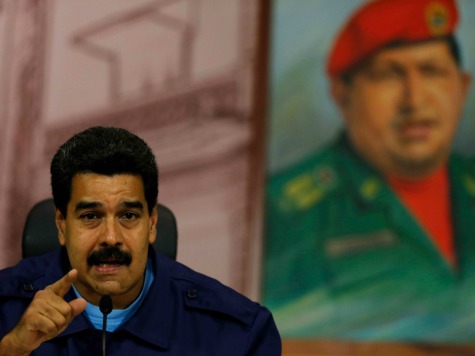As President Nicolás Maduro continues to silence those in the government who disagree with his oppressive socialist regime, the Venezuelan opposition’s most prominent leader not behind bars has been expelled from Parliament, and three generals have been arrested for dissent.
The government has made clear its desire to see Deputy María Corina Machado imprisoned. On Tuesday, she was stripped of her position in the Parliament, one day before her scheduled return to Venezuela from Washington, D.C., where she went to implore the Organization of American States (OAS) to intervene in Venezuela. Diosdado Cabello, president of the legislature, considered by many to be the real power in post-Chávez Venezuela, suggested that Machado lost her position “because of her actions and words” against the government. Cabello also accused Machado of “treason against the nation” for going before the OAS.
The OAS refused to allow her to testify before them, though Machado spoke about the current state of Venezuelan politics at a press conference in Washington.
Machado is expected to return to Venezuela Wednesday.
Machado is not the only member of the government to find herself in legal troubles for her political opinions. Tuesday, President Maduro announced that three generals in the Air Force were arrested Monday night for “aiming to turn the Air Force against the legitimate government.” He said, “This group captured has direct ties to sectors of the opposition and said that this week was decisive.” The identities of those arrested have yet to be divulged publicly.
The government of Venezuela has heavily focused on repressing protesters’ actions–physically attacking, torturing, and disfiguring young students who make up a large percentage of the Venezuelan opposition. President Maduro announced last week that he would shift his focus to opposition leaders in positions of power, arresting the mayors of opposition towns San Cristóbal and San Diego. The arrests of three generals uncomfortable with Maduro’s repression and the crusade against Machado follow this pattern, though it is worthy of note that the protests were triggered by the arrest of the head of the opposition party Popular Will, Leopoldo López.
López remains in prison, but he penned a column in Tuesday’s New York Times wherein he denounced the abuses of the Maduro regime. While noting that many Venezuelans, seeing his arrest, live in fear of speaking out, he wrote that failing to protest is “akin to a victim of abuse remaining silent for fear of inviting more punishment.” Explaining that he was arrested for murders committed by Chavista paramilitary members, López denounced the Organization of American States for their “shameful silence” and decision to abstain “from any real leadership on the current crisis of human rights and the looming specter of a failed state.” He concluded, “To be silent is to be complicit in the downward spiral of Venezuela’s political system, economy and society, not to mention in the continued misery of millions.”
Meanwhile, the streets of opposition strongholds like San Cristóbal, where Chavista paramilitary groups killed a pregnant 28-year-old this Monday though she was not participating in a protest, remain war zones.
This compilation of video footage of San Cristóbal, which lies near the Colombian border, shows a city ravaged by teargas, improvised barricades, and the specter of martial law:
One person who was shot by Chavista forces and another who was beaten to death by the Bolivarian National Guard raise the death toll in Venezuela from 34 to 36 since the current wave of protests began.

COMMENTS
Please let us know if you're having issues with commenting.